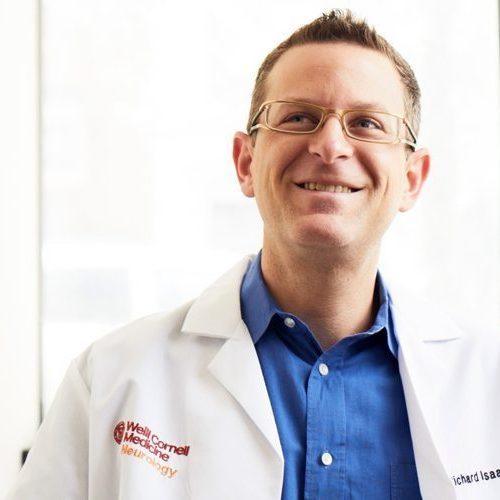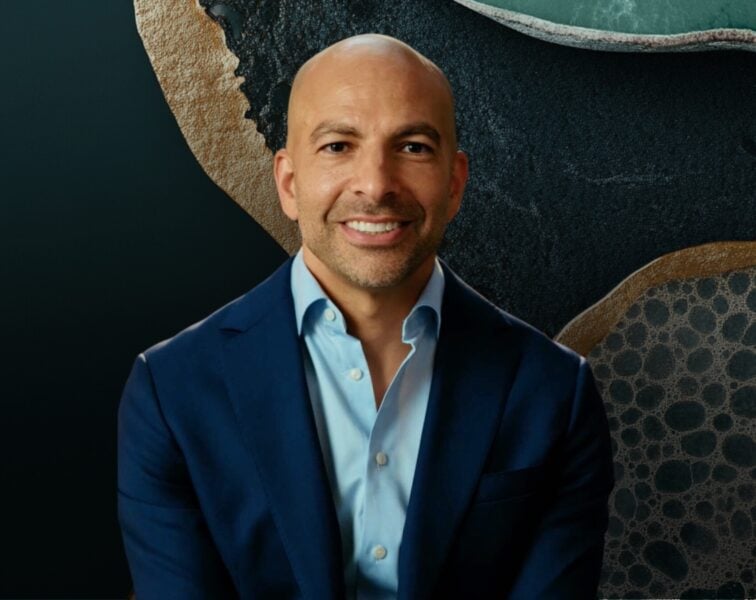Check out more content with neurologist, Richard Isaacson, M.D.:
In this episode, Richard Isaacson, a neurologist and director of the Alzheimer’s Prevention Clinic at Weill Cornell Medicine and New York-Presbyterian, discusses strategies for staving off Alzheimer’s disease. Richard shares a wealth of insight for people who want to know more about Alzheimer’s and what you can do to help yourself and your loved ones — starting today and continuing throughout the entire lifespan.
Subscribe on: APPLE PODCASTS | RSS | GOOGLE | OVERCAST | STITCHER
We discuss:
- Richard’s fun-facts (and alter egos): “bling” phones, Doogie Howser, and DJ Rush [8:00];
- Richard’s impetus to focus on Alzheimer’s disease: Uncle Bob [18:20];
- Starting an Alzheimer’s Prevention Clinic [27:00];
- How Alzheimer’s is diagnosed [30:00];
- Short-term memory, processing speed, executive function, and how they’re tested [35:45];
- Prevention vs reduction of Alzheimer’s [44:00];
- What is the prevalence of Alzheimer’s in America? [49:30];
- How do people actually die from Alzheimer’s or dementia? [51:30];
- How can people do everything right and still get Alzheimer’s? It’s all about AGE [55:15];
- The APOE gene [58:15];
- Why is the risk of Alzheimer’s higher for women? [1:13:00];
- How many different paths lead to Alzheimer’s? [1:15:45];
- What role does MTHFR play in Alzheimer’s? [1:19:45];
- What are the “ABCs” of Alzheimer’s prevention? [1:26:45];
- Baptists, Tauists, Syners, and Apostates [1:36:30];
- Concerns with statin use for high-risk patients [1:45:00];
- The use of Theracurmin [1:48:45];
- What are the five actionable things one can do to reduce the risk for Alzheimer’s today? [1:54:30];
- The cognitive reserve [2:14:15]; and
- More.
Get Peter’s expertise in your inbox 100% free.
Sign up to receive An Introductory Guide to Longevity by Peter Attia, weekly longevity-focused articles, and new podcast announcements.
Would you like access to extensive show notes and references for this podcast (and more)?
Check out this post to see an example of what the substantial show notes look like. Become a member today to get access.

Richard Isaacson, M.D.
Richard S. Isaacson, M.D. currently serves as Director of the Alzheimer’s Prevention Clinic, Weill Cornell Memory Disorders Program, and Director of the Neurology Residency Training Program at Weill Cornell Medical College/NewYork-Presbyterian Hospital. He previously served as Associate Professor of Clinical Neurology, Vice Chair of Education, and Education Director of the McKnight Brain Institute in the Department of Neurology at the University of Miami (UM) Miller School of Medicine. He completed his residency in Neurology at Beth Israel Deaconess Medical Center/Harvard Medical School, and his medical internship at Mount Sinai Medical Center in Miami Beach, FL. Prior to joining UM, he served as Associate Medical Director of the Wien Center for Alzheimer’s disease and Memory Disorders at Mount Sinai.
A graduate of the accelerated 6-year B.A./M.D. program at the University of Missouri – Kansas City School of Medicine, Dr. Isaacson now specializes exclusively in Alzheimer’s disease (AD) risk reduction and treatment, mild cognitive impairment due to AD and pre-clinical AD. His AD research focuses on nutrition and the implementation and longitudinal assessment of dietary interventions for AD management. Dr. Isaacson has a family history of AD, including his Uncle Bob (diagnosed while he was in high school) and his Dad’s Cousin (diagnosed six years ago) and passionately believes in a comprehensive, multi-modal approach toward both AD treatment and prevention. He is the author of two best-selling books geared for patients and caregivers, Alzheimer’s Treatment Alzheimer’s Prevention: A Patient & Family Guide (2012 Edition) and most recently, The Alzheimer’s Prevention & Treatment Diet.
Dr. Isaacson’s career in education spans undergraduate (student), graduate (resident/fellow), and continuing (faculty) medical education, as well as patient, caregiver and community education/outreach. His recent efforts have focused on the development of Alzheimer’s Universe (www.AlzU.org) a vast online educational portal on AD, with results published in the Journal of the Prevention of Alzheimer’s disease. He has chaired the AAN Undergraduate Education Subcommittee working group in dementia and received the AAN Education Research Grant for “Evaluating the effectiveness of Continuum: Dementia as a teaching tool for medical students” published in Neurology. He recently led a collaborative education and health information technology research initiative at Weill Cornell, Harvard, UM, U. Pennsylvania, U. Rochester published in Neurology. He is the author of numerous publications, his research in neurology and medical education has been presented at scientific meetings nationally and internationally, and was awarded the 2009 AAN A.B. Baker Teacher Recognition Award. He is also a member of the Alpha Omega Alpha Medical Honor Society. [weillcornell.org]



